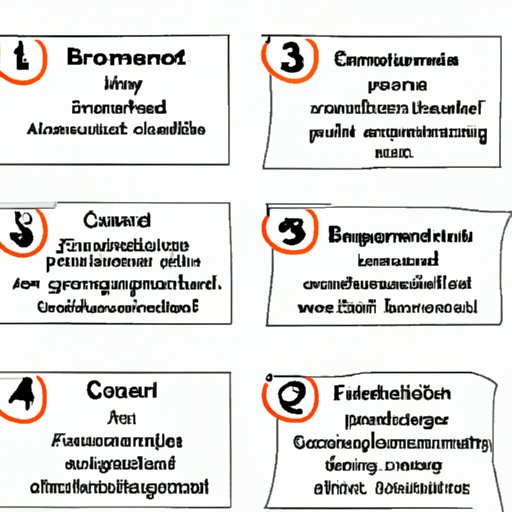
Understanding Education Levels: A Comprehensive Guide
Choosing the right education level can be a daunting task, especially considering the vast number of options available. With primary school, secondary school, vocational schools, colleges, and universities, it can be challenging to navigate the education system efficiently. Each of these options has its purpose and benefits, which can help individuals achieve various personal and professional goals. In this article, we’ll explore the different education levels, clarify any confusion around terms, and provide advice for choosing the right level for you.
Defining Education Levels
Education levels are often defined by an individual’s age or learning milestones. These levels are usually categorized into primary education, secondary education, and higher education. Primary education focuses mainly on teaching essential skills, such as reading, writing, and arithmetic. Secondary education builds on the knowledge acquired in primary education to provide deeper insights into a variety of subjects. Higher education focuses on providing specialized training and knowledge to prepare individuals for specific professions.
Breaking Down the Different Education Levels
Primary Education:
This is the foundational education level that helps build the individual’s academic skills. Primary education is usually compulsory for children aged between 6 to 11 years. It focuses on arithmetic, reading, writing, languages, Sciences, and Social Sciences.
Secondary Education:
Secondary education is the next level of education after primary education. It is usually aimed at developing the students’ academic skills and preparing them for higher education or the workforce. This level comprises lower secondary school and upper secondary school. Lower secondary school is usually three years (ages 12 to 14), and upper secondary school is usually three years (ages 15 to 17).
Higher Education:
Higher education is a level of education that is offered beyond secondary education. It usually takes place in universities, colleges, or vocational schools. Higher education programs aim to equip students with specialized knowledge and skills to prepare them for specific trades or professions. Higher education includes undergraduate degrees, postgraduate degrees, and vocational training that leads to certifications.
Breaking Down Different Terminology
Often, people confuse different terminology relating to education. Terms such as grades, degrees, and certifications can be confusing because they can mean different things depending on the education level.
Grades:
Grades are table scores that indicate the level of academic achievement of a student. In primary and secondary education, grades are cumulative scores of ongoing assessments taken throughout a term or semester.
Degrees:
A degree is a qualification awarded to individuals who have completed specific academic programs. At the undergraduate level, a degree is usually a four-year program, while postgraduate degrees range from one to seven years, depending on the program’s nature.
Certifications:
Certifications are credentials awarded to individuals who complete a particular course or training. It is usually obtained after passing an exam that tests the applicant’s proficiency in a particular area of study.
Choosing Your Education Level
Choosing the right education level depends on several factors, such as your academic goals and interests. Before selecting a level, it is essential to evaluate your career goals and aspirations. Consider the time and cost commitment required for each education level, as some can take up to ten years to complete. Also, factor in the employment prospects and earning potential of each level.
Primary and secondary education:
Primary and secondary education is compulsory in most countries and provides a foundation for higher education. It’s essential to do well in these foundational levels to qualify for admission into higher education institutions.
Higher Education:
When choosing higher education, consider your career interests and job requirements. Research the employment prospects and companies that seek employees with your preferred educational qualifications. Most organizations require candidates with a university degree or an equivalent certification, creating a potentially high return on investment.
Navigating the Education System
Navigating the education system can be overwhelming, but certain steps can be simplified to assist in decision-making. Research potential institutions, courses and evaluate their fit with your interests and goals. Attend open days and speak to current students and faculty members to get an idea of the environment and program requirements. Additionally, reviewing the admissions requirements and deadlines can help in planning and avoiding any stressful last-minute rush.
From High School to Graduate School: Exploring Different Education Levels
High School:
A High school provides secondary school education that prepares students for higher education and employment. It usually lasts four years and requires a range of credits to graduate, with grades being a staple of assessment.
Undergraduate Degrees:
An undergraduate degree is an entry-level post-secondary degree that usually takes four years to complete. It offers a broad knowledge base and teaches critical thinking skills that prepare students for work or further studies.
Postgraduate Degrees:
Postgraduate degrees are advanced degrees taken after an undergraduate degree. They are designed to offer specialized training in a particular field of study and can take one to seven years, depending on the program.
Vocational Training:
Vocational training is a form of education that provides specialized experience and training to prepare individuals for specific jobs or trades. It takes less time to complete and can offer both certifications and diplomas.
Choosing Your Path
Choosing your education level can have long-term effects on your career and personal development. While some people know precisely what they want to study and achieve, others may need time to deliberate their interests and goals’ best fit. It is paramount to consider your passion, the economics of each level, and the future prospect of employment prospects for your preferred degree.
Conclusion
In conclusion, an individual’s education impacts their personal and professional development and cannot be overlooked. Understanding the different education levels and their purposes is essential in making informed choices. Thorough research, goal browsing and attending open days can help in identifying the best level that caters to your preferences, career goals, and aspirations. We hope this article provides useful insights into the education system, and we wish you all the best in your educational pursuits.




